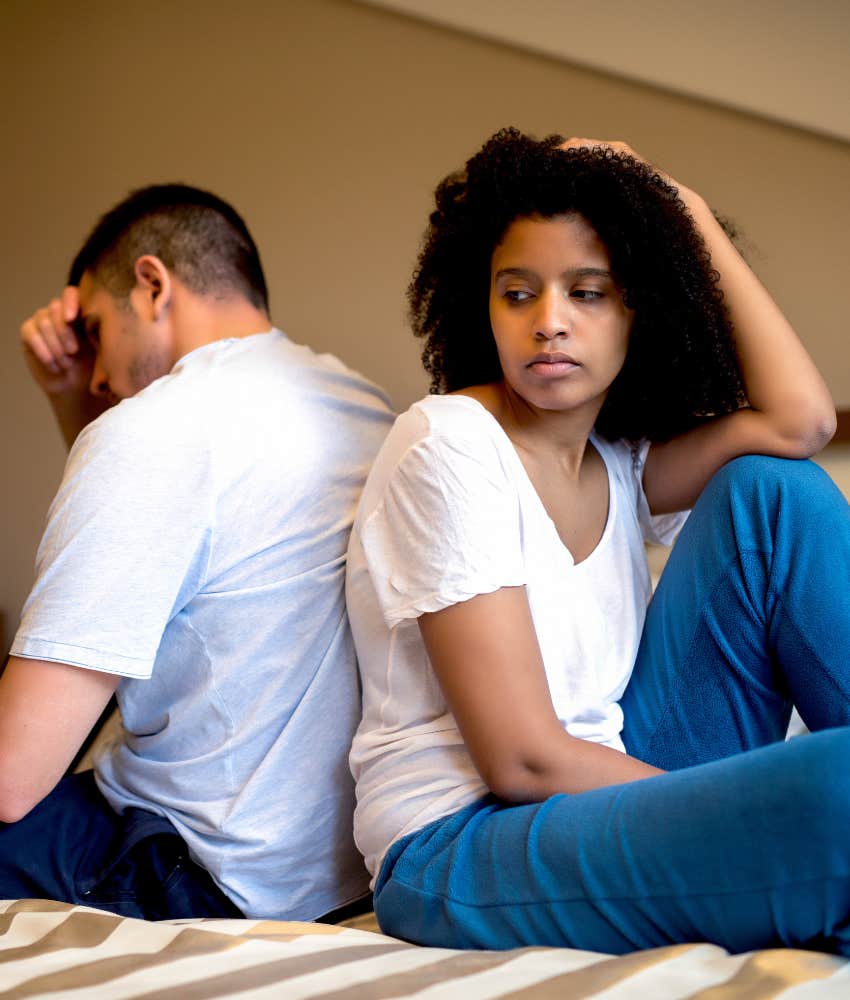The 6 Most Desperate Reasons People Stay In Unhealthy Relationships, According To Psychology
Why people stick to a bad relationship with all their heart and soul.
 Carlos Sabillon | Unsplash
Carlos Sabillon | Unsplash Some relationships begin on good terms, go through trials of highs and lows, yet survive because the relationship has all the basic requirements — trust, connectivity, and respect. But, due to several uncontrollable factors, a relationship might turn into a toxic one.
Unhealthy relationships are self-degrading, self-sabotaging, and lead to ultimate suffering on both ends. Even when there are numerous available opportunities in the dating world, what is it that keeps someone anchored to an unhealthy relationship? Is it love? Or is it a habit?
Here are the most desperate reasons people stay in unhealthy relationships:
1. To avoid being lonely
Loneliness can make one feel like it's the end of the world. It significantly lowers a person’s self-confidence and distorts overall self-perception. Someone who has been in the grasp of loneliness would never like to return there.
Being in a committed relationship has a social connotation. Some people believe that having a partner and being able to flaunt it increases your social status and reputation. The mere physical presence of your partner, no matter how abusive, how inconsiderate, or how indifferent they are, can sometimes make you feel comfortable.
A 2022 international study of adolescent victims of physical dating violence who stay in abusive relationships found "most of the adolescent victims of physical dating violence remain satisfied and committed toward their abusive relationship, giving way to long-term relationships in which the abuse tends to persist and increase in frequency and severity."
We often hesitate to let go of our ‘habit’ of the person. The thought of waking up in the morning to emptiness can be unnerving to some. It is not because you intensely love being with your partner.
You might as well ignore each other just after you wake up, but it is simply because staying alone has not been usual for so long. You want to make sure you don’t feel lonely, lost, and unwanted.
2. Low self-esteem
 Dusan Petkovic via Shutterstock
Dusan Petkovic via Shutterstock
Functioning with low self-esteem is like fighting a battle within yourself every single moment. You constantly question your worth, your capacities, and what you are bringing to the relationship.
Low self-esteem fools us into thinking we always deserve much less than what we are getting from the relationship, as the significance we put on ourselves is much lower than our deserving value. Some people tend to measure their worth based on whether they have a partner or not, whether the partner accepts them or not, values them or not, or appreciates them or not.
When you have low self-esteem, you need constant validation and approval from someone. And if that person is someone you love, it makes you feel valued and wanted. If you are continuing a bad relationship that has nothing to offer you, ask yourself if you are putting a deserving value on yourself.
When you start putting yourself on a higher pedestal, you will come to realize there are innumerable reasons to exit the relationship.
A 2015 study of women experiencing interpersonal domestic violence (IPV) showed that "damage to self-esteem and identity lingered. The journey through and out of IPV is often marked by an initial erosion of sense of self (identity deconstruction) followed by the identity reconstruction through an extended process of change aimed at rebuilding self-esteem, mental well-being, self-efficacy, and ultimately self-identity."
3. Codependency
Codependents have an addiction to relationships, just as any addict would use substances to get that ‘high’ feeling. Sadly, when a person is overly emotionally dependent on their partner, more often than not, they have low self-esteem. This is why they measure their self-worth by someone other than themselves.
Codependents usually respond to external cues more often than to internal needs. They identify themselves to be so fused with the other person that they often end up dismissing their own perception, ideas, and feelings, unless and until they are validated and approved by someone else.
Getting out of a relationship, even if it is harming them, becomes inevitably difficult for them, because every single one of their behaviors needs to be validated, assured, and emotionally sanctioned by their partner.
"Women who remain with abusive partners employ cognitive strategies that help them perceive the relationship in a positive light," stated a study on coping with an abusive relationship in the Journal of Marriage and Family.
4. Comfort in familiarity and fear of uncertainty
Some relationships are a mere “to battle with a known devil is better than facing an unknown devil”. We rationalize with ourselves that we might already be getting the best we can. The fear of uncertainty keeps us from taking a leap of faith or moving towards a better opportunity or stepping out of our comfort zone to embrace positive change.
A person familiar with the comfort, predictability, and warmth of routine might genuinely feel perturbed when getting out of a relationship. Who knows if the next relationship they pursue will put them in a more trying situation or not?
The fear of getting themselves into a worse relationship than the current one keeps them suffering in a dead relationship.
A 2022 study identified three main themes for why women stayed: "The first theme was that of investment, which contained the sub-themes of marriage, pregnancy, and keeping the family together. The second theme was that of entrapment, which contained sub-themes of economic dependence, physical entrapment/social isolation, learned helplessness/coping mechanisms, and religious/cultural beliefs. The third theme was love (no subthemes)."
5. Rejection and failure
 Prostock-studio via Shutterstock
Prostock-studio via Shutterstock
What if they get rejected by the next person they try to be in a relationship with? The fear of failure, after trying so hard, keeps them trying harder to mend the relationship. Some people cannot completely accept that their relationship is on the verge of failure, and they have to exit.
Even if they do, will they be able to invest themselves emotionally and physically to the same degree as they are currently doing? All these questions make it harder for them to rationally decide the fate of a messed-up relationship.
6. New investment of time and energy
The thing people who cannot come out of a bad relationship worry the most about is already invested time and effort. For them, it's a shameful event to move out of a relationship they have built for so long. Ending a relationship just because it is not working out well is not their ideology.
Studies from 2020 revealed that "leaving is typically not a single, sudden event, but rather a slow process through several stages," and "social structural factors all too often add insult to injury when survivors reach out for help and how helpers’ beliefs and behaviors are tied to patriarchal norms," as well as factors affecting "those married to an affluent, high-status abuser often encounter unique barriers."
They believe that sticking to the end, even if it degrades the emotional and psychological well-being of both partners, is the right attitude to hold. But, believe me, the more you allow negativity to affect you, the more difficult it will be in the end.
A bad relationship has long been dead, no spark. It is filled with miscommunication, or at times a complete lack of communication, repeated conflicts, arguments, and an absence of empathy, respect, and understanding. A relationship that hinges on abuse and manipulation is the worst kind.
But surprisingly, people keep dragging a relationship on, even after knowing that it is not yielding any good results for either of the partners. Some people will cross miles to somehow keep supporting an undeserving relationship.
If the relationship is dead, you should end it. And you should end it at the earliest possible time.
Shreyasi Debnath is a psychologist and writer who focuses on mental health, self-care, and self-love.

